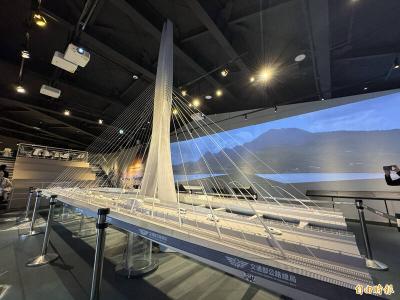The Taiwan Agriculture Research Institute (TARI) has developed a technique for cultivating danshen, or red-rooted salvia that is an important ingredient in medicines, a researcher announced yesterday.
The plant is used to make preparations for treating a wide variety of diseases.
Danshen, also known as salvia miltiorrhiza, or red-rooted sage, is used locally by pharmaceutical companies producing expensive Western and traditional Chinese medicines, TARI researcher Lin Yi-kung (林義恭) said.
PRICEY IMPORT
Taiwanese pharmaceutical companies import as much as NT$6 million (US$178,000) worth of the plant each year to use in medicinal preparations.
Extract of danshen is made mainly from the roots of the plant, which the institute harvests in late January after a cultivation period of 18 months to ensure a maximum content of tanshinone IIA, an active ingredient from which salvianolic acid B can be extracted, Lin said.
Besides the roots, researchers have been extracting salvianolioc acid B from the plants’ leaves.
98 PERCENT
Using a specially designed extraction system, TARI can produce salvianolic acid B of a purity of up to 98 percent — much higher than that of the imported variety, which mainly comes from China — from the red-rooted salvia cultivated at the TARI base.
Lin said that the base is located in Wufeng Township (霧峰) in Taichung County.
TARI will be pleased to transfer the technique to interested parties in Taiwan, he said.
Danshen is widely used in traditional Chinese medicine — often in combination with other medicinal herbs — to treat a diversity of ailments, particularly cardiovascular disorders such as hardening of the arteries and blood clotting.
Extract of danshen is also widely used in pharmaceutical preparations for asthmatic bronchitis, glaucoma, kidney disease, liver disease, diabetes and lung cancer.
OFTEN USED
A Ministry of Economic Affairs survey found that danshen was the most often used Chinese herb in terms of single, isolated ingredients in traditional Chinese medicine preparations, as well as being one of the most studied medicinal herbs, second only to ginseng.

Chinese President Xi Jinping (習近平) is unlikely to attempt an invasion of Taiwan during US president-elect Donald Trump’s time in office, Taiwanese and foreign academics said on Friday. Trump is set to begin his second term early next year. Xi’s ambition to establish China as a “true world power” has intensified over the years, but he would not initiate an invasion of Taiwan “in the near future,” as his top priority is to maintain the regime and his power, not unification, Tokyo Woman’s Christian University distinguished visiting professor and contemporary Chinese politics expert Akio Takahara said. Takahara made the comment at a

Upon its completion next year, the new Tamkang Bridge (淡江大橋) in New Taipei City is to be an important landmark in Taiwan, alongside Taipei 101, Minister of Transportation and Communications Chen Shi-kai (陳世凱) said today. The bridge is scheduled to be completed in December next year and open to the public in the first half of 2026, connecting New Taipei City’s Tamsui (淡水) and Bali (八里) districts. It is an asymmetric single-tower suspension bridge, nearly 70 stories tall, designed by world-famous architect Zaha Hadid. The bridge aims to alleviate traffic in Tamsui and on the Guandu Bridge (關渡大橋), in addition to increasing the

PROBLEMATIC: Popular hotpot restaurant chains were among the list of restaurants that failed the inspection and have been ordered to remove bad ingredients The Taipei Department of Health’s latest inspection of hotpot ingredients in hotpot restaurants resulted in a 16.7 percent failure rate. Eight vegetables had excessive pesticide residue and two other items had aflatoxin and excessive preservatives. As the weather is getting colder, more people eat at hotpot restaurants so a random inspection of ingredients was conducted in October to ensure food safety, the department said. Food and Drug Division Director Lin Kuan-chen (林冠蓁) said 60 different ingredients were tested: 15 high-risk vegetables, 15 processed food items, 10 soy-based food items, five meat items, five lamb items, five seafood items and five peanut powder

EXERCISES: A 2022 article by a Chinese intelligence expert identified at least six People’s Liberation Army assault boats hidden inside the Hong Kong-flagged ship A Hong Kong-flagged cargo ship that had been docked at Taichung Port and which previously took part in Chinese military exercises departed from the port on Saturday, the Taiwan International Ports Corp’s Taichung branch said yesterday. The statement came in response to a post on the social media platform X by Taiwan-based journalist Chris Horton that said the ship, the SCSC Fortune, had been docked at the port since Tuesday and questioned whether Taiwan has any rules regarding foreign civilian vessels that have participated in People’s Liberation Army (PLA) exercises. Horton referenced a 2022 article by Chinese intelligence expert Rod Lee that